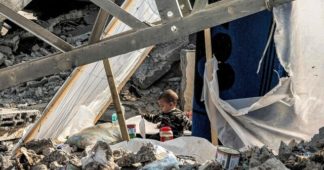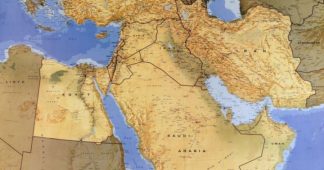By Marwan Emil Toubassi*
There is a consensus between the components of this Zionist-American thought, Israel and the United States, on the necessity of reshaping the Middle East in line with their strategic interests, which I mentioned in previous articles, and which is evident today when talking about the so-called Greater Israel as the nucleus of this project by expanding the existing territory of Israel which is with no declared borders, From the Philadelphia line to the Litani river in lebanon and areas east of the Jordan River in the Kingdom of Jordan , passing through southwestern Syria and perhaps more.
A few days ago, Netanyahu was speaking at the United Nations in an almost empty hall from which most of the representatives of the countries of the world had withdrawn, as if he did not represent the State of Israel, but rather as the head of the government of the whole world and as the chief rabbi repeating what came in the Torah and defining the maps of the region and even the world that he wants as the leader of “God’s chosen people.” The “forces of good” in the world trample allInternational resolutions in the Security Council and even those issued by the General Assembly. He accuses the world of anti-Semitism and hostility to the only victim in history, and even of being hostile to the foundations of global peace and security, which he sees himself as the only guardian of them in the face of “the forces of evil,” and thus announces the beginning of a process that changes the face of the Middle East.
What helps Netanyahu to achieve this arrogance, superiority, and insolence is his reliance on endless support from both parties equally in the American arena, which falls under the influence of the economic and financial interests of the Zionist movement that controls most of the various industrial complexes there, and this is the calamity and epidemic of the existing international system that prevents through intimidation. Intimidation turned the declaration of a number of countries in solidarity with the Palestinian people into practical steps that would punish the occupying state, and the weakness of the Arab position that was actually opposed to these trends in the face of many of its countries being drawn into American policies in the region and even working as allies or even partners in facilitating the implementation of the project as if it were a project that will serve the interests of the Arab peoples.
But the main question is, can they actually implement this project? To try to answer this, we should take into account several factors, which are summarized in several issues, the most important of which are:
First: The ability of the culture and forces to resist this modern colonial project, despite the continuous military and political pressure, successive assassinations and strikes, the threat to occupy new areas, and attempts to undermine the historical struggle heritage of the PLO as a national liberation movement and besiege the role of the national authority as it is supposed toAs a stage towards the state becoming a “services authority for the residents of the regions,” the culture and forces of resistance still enjoy a broad popular support base and tactical flexibility that has enabled these forces of liberation and resistance to continue until now despite the previous and currently increasing pressures that I believe have not ended. The success of the American-Israeli project depends largely on their ability to completely eliminate these forces and to cultivate the awareness and culture of national liberation among our Arab peoples, including our Palestinian people, something that has not been achieved so far and may not be achieved later, and this is something that depends on us according to much of what is required. From us on the basis of continuing our struggleTowards ending the war of genocide against Gaza and overthrowing the occupation, and our broad unity on the basis of the unity of the land, the people, and the national political cause.
Second: Regional stability, as reshaping the new Middle East requires political and economic stability in major countries such as Iraq, Syria and Lebanon, which are countries suffering from a state of chronic instability due to the conspiracy of the so-called Arab Spring, which formed the first phase of the plan for the new Middle East. Without regional stability, it will be difficult to implement any long-term vision to reshape the region.
Third: The Iranian role, as Iran plays a role in attempts to strengthen its geopolitical position in the region and as an important player at the international level seeking to achieve its interests and project in the region in the absence of any Arab project. Any attempt to reshape the Middle East without dealing with Iranian influence and role will face great difficulties. The tensions between the United States and Iran make implementing the project complicated, unless Iran’s interests and ambitions are met, or at least the minimum of them that ensures Iran remains an important and influential player.
Fourth: The international community: Implementing a project of this size requires support or at least tacit acceptance from the international community. With increasing criticism of the policies of Israel and the United States in the region, especially with regard to the Palestinian issue, the United States and Israel may find it difficult to obtain this support.
Fifth: Timing: The issue of timing of implementation is very important. With increasing regional and global tensions, especially in light of the conflict in Ukraine, the China Sea, Latin America, Africa to some extent, and other international files, there may be greater interest among international powers to prevent matters from getting worse in the Middle East.
Returning to the course of political history, we find that there is a link to the current project to reshape the Middle East with the results of the First and Second World Wars, especially with regard to the Sykes-Picot Agreements that defined the borders of countries in the region after the collapse of the Ottoman Empire.
The Sykes-Picot Agreements, which were part of Western colonial efforts to divide the region according to European interests specifically with American blessing and support, established a political and economic border system that did not necessarily reflect the social or historical realities of the peoples of the region. After World War II, the major powers focused on rebuilding Europe and Japan, while the problems of the Middle East continued without a radical solution, the first and most important of which was the result of the establishment of Israel as a colonial project that served the interests of those powers in 1948 at the expense of our people and their historical rights and the subsequent conflicts according to the expansionist settlement foundations. For thisThe rogue state reinforced the division, conflict, and tension that had existed in the region since that period.
The new project for the Middle East, as it appears today, may be an attempt to complete what the colonial powers started at the beginning of the twentieth century. But this time, focusing not only on geographically redividing the region, but rather on reshaping the political, economic and military systems of countries in a way that suits American and Israeli interests on the one hand, as long as unipolar hegemony remains the characteristic of this international system despite the beginnings of its failures, I believe, and also with the aim ofTrying to contain the influence of powers such as Iran, Russia, and China, on the other hand, which are trying to develop their interests in our region and the broader region in cooperation with international groupings such as BRICS and others.
But if the “New Middle East” project is successfully implemented, as described by the Western powers and Israel, it will certainly be at the expense of the inalienable national rights of our Palestinian people, most notably the right to self-determination and the establishment of their independent state in accordance with the principle of UN Resolution 181, which is not achieved untill today due to the complexities of the conflict and the vision of the United States according to its relationship with the Zionist movement. And to find “solutions” that seek to ignore the basic rights of our Palestinian people, such as establishing a Palestinian entity that they call “a state” without sovereignty and without borders consistent with the pre-lines of June 4, 1967, and without implementing UN Resolution 194 regarding the rights of refugees and without the basic right to self-determination.
Also, the expansion of the normalization agreements with Israel without a real solution to the Palestinian issue, which will take place within the framework of the new Middle East Project without including the rights of the Palestinians in a fair manner, as I mentioned. Therefore, if they succeed despite the obstacles, the Palestinian issue will become isolated and neglected in the context of broader interests in the region and the world, which is something that efforts today must be focused on resisting by all popular, legal, diplomatic and media means within the framework of broad Palestinian unity and strengthening international solidarity according to a clear vision. There is no room for fear or keeping up with the malicious American mirage, or waiting until regret is of no use.
We remind our readers that publication of articles on our site does not mean that we agree with what is written. Our policy is to publish anything which we consider of interest, so as to assist our readers in forming their opinions. Sometimes we even publish articles with which we totally disagree, since we believe it is important for our readers to be informed on as wide a spectrum of views as possible.











